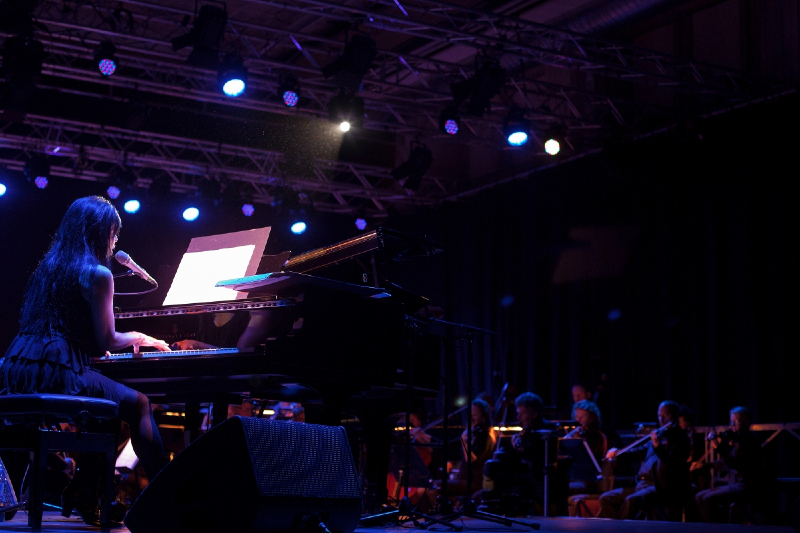It Is On The Stage Where She Makes The Greatest Impact
By Anna Wallentin (Translated by Alan Nillson)
She has said “no” to all interviews!
The journalist inside me explodes in an indignant pose and my heart cries out in protest. But what the hell, she’s in town! Or rather, we are both in Oslo.
This happens late on a Sunday evening. The black rose of avantgarde, Diamanda Galás is currently the protagonist of my life. I can hear her sound check when my errands take me to NRK, Norwegian radio’s premises. The atmosphere is dense. Air like a heavy, melted bar of chocolate. And then the rehersals the next day. She has no makeup, an attitude of “nobody fucks with me” and is clearly used to minding her own business.
Now she shares the podium with the KORK (the city’s radio orchestra), who are to follow the conductor and the score. Promoter Jon jumps up and down from his seat to give instructions An hour before the rehearsal we, Jon and I, sit at a café.
– I was terrified when we were about to meet, he exclaims about the first meeting with Galás, and nervous that she would not like my arrangements.
– But then she seemed to approve of the bits I had sent so I had to continue to build on darkness. The more I emphasized on darkness, the happier she became.
The week passes and with it comes the concert on Thursday evening. Quarter tones grinds against the diatonic scale, and then the orchestra quietens, while Diamanda Galás makes one of her “room expanding” solo performances.
Her makeup is thick and hair flattened, while the dress falls in black ruffles. Her uncovered legs in nylon and pointed shoes, allows her to work on the pedals smootly. Dogs snarl, yelp and growl. And so the Walz, one of Ness’ creations that are like a comic hell dance, where trumpets invites the other musicians into mocking dissonances.
And that’s when it unleashes, the pressure on the gears that worked on all possible options to get into a dialogue with her: Is it not the softness of nerves, that trembles visibly behind a shield of gloom? Is she not sufficiently exposed, the facial expression that threatens to release a flood of tears?
The musicians clapping, she claps. When she meets her audience again, she is like an open book. Finally, I will not carry just a quote with me, home to the NT [Norrköpings Tidningen – a local newspaper], but an encouragement to see her soon again. For whether we like it or not, it is on stage – and not through the printed media – where she makes the greatest impact.
Source: Norrköping Tidningar (November 20, 2012)




